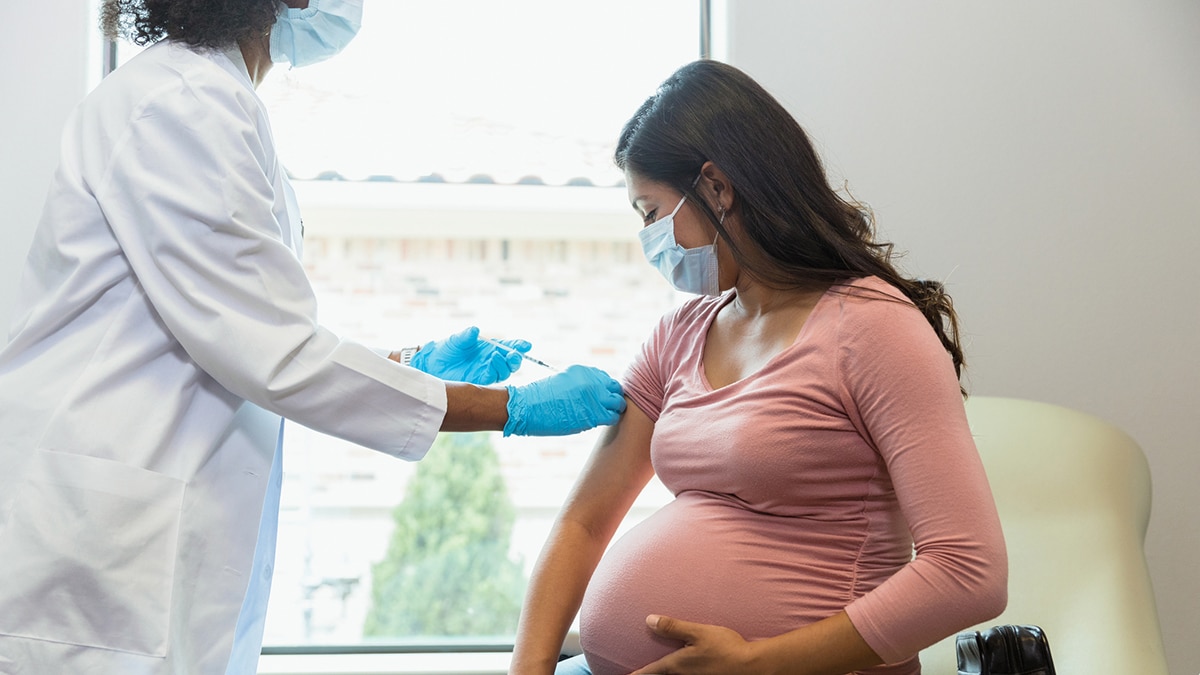Key points
- Some infections can affect a man's or woman's reproductive health.
- Some infections can cause more severe illness in a pregnant woman.
- Some infections can cross the placenta and harm a fetus.

Why I should be concerned about exposure
Working with or exposure to certain bacteria, viruses, or other infectious agents can impact reproductive health.
Some infections have been associated with infertility.
Some infections can pass to a fetus during pregnancy and cause a miscarriage or birth defects.
Infections like seasonal influenza (the flu), COVID-19, and pneumonia can cause more serious illness in pregnant women.
Who is at risk

Workers who might be exposed to infectious agents include:
- Healthcare workers
- Veterinary medicine and veterinary service workers
- Childcare workers and teachers
- Tattooists and body piercers
- Laboratory workers
Which infectious agents can be harmful during pregnancy?
These and other infections can pass to the fetus during pregnancy or cause more severe illness to a pregnant woman.
Vaccine-preventable infections that can cause more severe illness in a pregnant woman and/or harm a fetus:
- Chicken pox (varicella zoster virus)
- Coronavirus disease (COVID-19)
- Hepatitis B virus (HBV)
- Influenza
- Rubella (German measles)
- Measles
Other infections that can cause more severe illness in a pregnant woman (many can also harm a fetus):
- Hepatitis E virus (HEV)
- Parvovirus B19 (Fifth disease)
- Malaria
- Listeria
- Coccidioidomycosis (Valley Fever)
- COVID-19
Other infections that can harm a fetus when infection occurs in pregnancy:
- Cytomegalovirus (CMV)
- Ebola virus disease*
- Human Immunodeficiency Virus (HIV)
- Herpes
- Toxoplasmosis
- Zika Virus
*Please note that a vaccine exists for Ebola virus disease but is not recommended for everyone. CDC recommends speaking to your physician before vaccinating for EBV during pregnancy.
What I can do to reduce or eliminate exposure
Make sure your vaccines are up to date
Get your seasonal flu shot. Pregnant women should get the flu shot (inactivated vaccine), not the nasal vaccine (LAIV, live attenuated nasal vaccine).
Do not get the MMR (measles mumps rubella) vaccine during pregnancy. If you are a pregnant healthcare worker who is not vaccinated and not immune, do not work with rubella-infected patients.
Women who are pregnant should stay up to date with their COVID-19 vaccines. Studies including hundreds of thousands of people around the world show that COVID-19 vaccination before and during pregnancy is safe, effective, and beneficial to both the pregnant woman and the baby.
Wash your hands often if you are around someone who is sick.
If you work in healthcare, veterinary medicine, or childcare
Follow recommended infection control guidelines carefully. Following these standard precautions will generally mean you are at no higher risk of catching a harmful infection than other workers. However, there are exceptions for some pregnant women and some infectious agents.
CDC recommends that pregnant healthcare workers should not provide care for patients with Ebola. Furthermore, the recommended PPE for care of patients with Ebola may be particularly restrictive and uncomfortable for these workers.
If you work in a laboratory
Follow safety guidelines for laboratory workers. These guidelines will help you prevent laboratory-acquired infection when followed correctly. However, pregnant lab workers should handle certain pathogens with special precaution.
For laboratory work with concentrated cultures of pathogens, refer to the Biosafety Manual for Biomedical Laboratories.
Resources
Getting help
Talk to your supervisor or occupational safety officer about infection control procedures to keep you safe. It's safe for pregnant workers to give and receive flu shots at work.
Talk to your doctor about potential hazards at work. Make sure to mention that your job exposes you to infectious agents. Your unique medical situation, vaccination history, and specific work environment should be considered when assessing ways to reduce your risk.
For some pregnant workers, standard infection control procedures are enough to keep their risk at the same level as other workers. For others, adjusting tasks to reduce exposure to certain infectious agents, adjusting personal protective equipment, or other options might be considered.
For information on the Pregnant Workers Fairness Act, please see resources from the U.S. Equal Employment Opportunity Commission (EEOC) website.
Where I get can get more information
Learn more about vaccines for pregnant women
Learn more about getting COVID-19 vaccines while pregnant or breastfeeding
Learn more about infection control in healthcare settings
Learn about guidelines for human and animal medical diagnostic labs
Use of biological safety cabinets and guidelines for medical diagnostic labs
CDC has additional information on biosafety
CDC guidance on working with Zika virus in laboratories and pregnancy and Ebola
